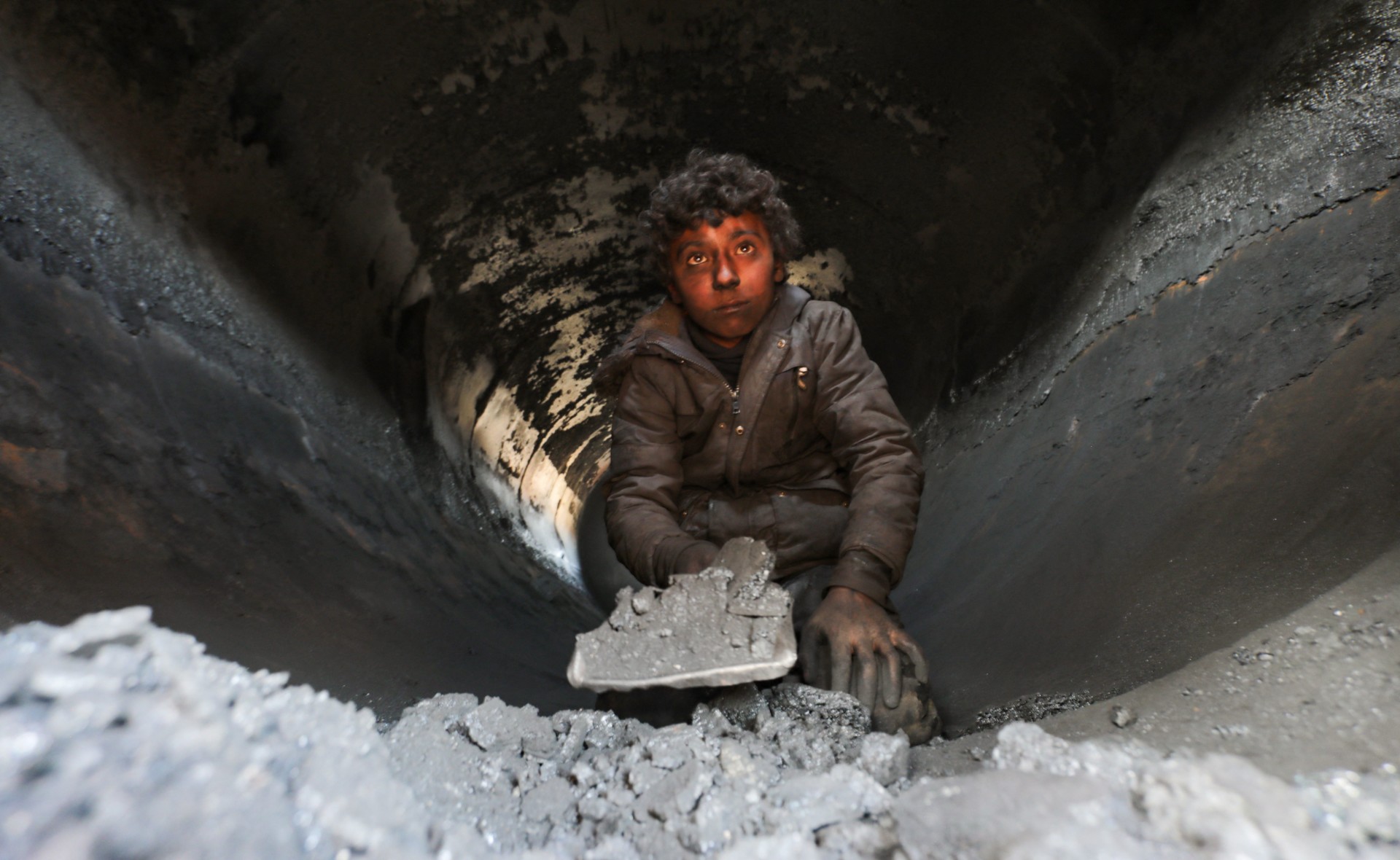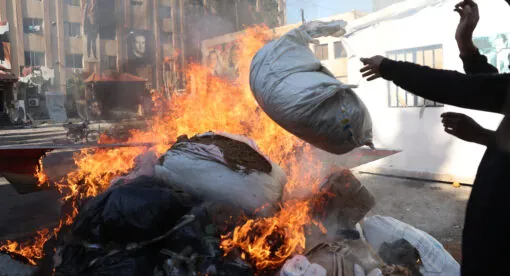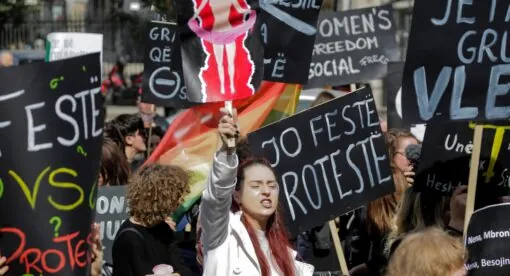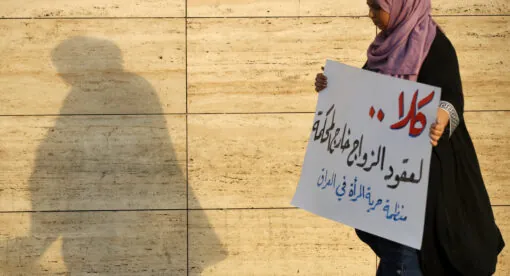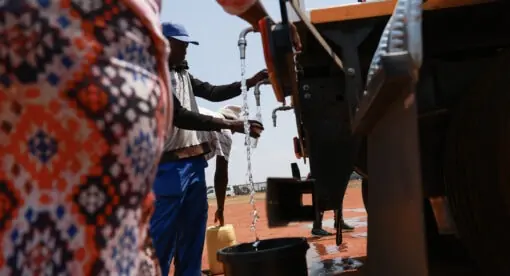When his wife brought his sixth child into the world in early 2021, what should have been a happy day for Aref* was also a distressing one. He knew he could not afford the bill at the private hospital in Hamah, to which they were forced to go after the state-run hospital told them all beds were occupied.
Even when Aref managed to pay the bill with the help of a friend living abroad, he could not stop worrying about how he would feed his growing family. When he should have been out sowing his land with wheat, he was stuck at home, unable to afford the diesel required for his machinery due to the country’s crippling energy shortages. Neither could he afford seeds and fertilizer, which are imported from abroad, after the Syrian lira lost 57 percent of its value, leading to skyrocketing prices for imported goods.
Sick of seeing his children grow hungry, Aref decided in late March to travel to war-torn Libya to work in his profession as an agricultural engineer, despite his wife’s protestations. “The burden on me is so great, my six children, a wife, and my two elderly parents,” he said when explaining his decision to travel. “If I stay here, I can’t do anything, not even sow my land.”
Aref’s story is similar to that of many former members of Syria’s vanishing middle class, now reduced to poverty. State institutions are increasingly atrophying and unable to meet the basic needs of the population, while regime officials are increasingly relying on criminal activity to turn a profit through extortion, cross-border smuggling, and a booming drug trade. Syria’s public-sector employees have been transformed from a middle class supportive of regime stability into a disgruntled mass of desperate people unable to keep their families fed. This transformation is a manifestation of – and an accelerant for – the collapse of the state, pushing public-sector employees to increasingly rely on graft to survive. Despite these growing grievances with the regime, Syrians residing under regime control are unlikely to mobilize or change their loyalty due to fear of repression and a sense that no better alternatives are available.
As the United States and other nations reassess their engagement with Syria, they should focus on humanitarian efforts to protect and provide for Syrians made vulnerable under the Assad regime’s corruption, demanding transparency from the regime on how humanitarian aid is used, and providing assistance to those outside of the regime’s control.
A Vanishing Middle Class
Ten years ago, the majority of Syrians were hardly rich, but a large middle class enjoyed a relatively comfortable level of subsistence. Prior to the unrest that began in 2011, Syria was a lower-middle-income country with a GDP per capita in 2010 of $2,806 according to IMF estimates, equaling that of Sri Lanka and only slightly lower than Morocco’s and Egypt’s. Now, about 90% of its residents live below the poverty line, and hunger is becoming increasingly prevalent.
The liberalization of the Syrian economy starting in the 1990s increased the gaps between rich and poor. The state significantly cut back services and in the 2000s reduced subsidies on fuel and agricultural inputs sold to farmers, once a reliably loyal or at least quietist segment of society. By the time the Arab Spring uprisings began in late 2010, large segments of Syria’s underclass, residing in rural regions and in slums on the outskirts of major cities, felt they had nothing to lose and revolted. However, large swaths of the Syrian urban middle class, particularly state employees and residents of Damascus and Aleppo, alongside religious minorities, remained quiet or supportive of the Syrian regime.
Newlines interviewed dozens of those who refused to pick sides in the war or supported the regime, many of them state employees, who said they felt that the unspoken deal under which they remained quiet in exchange for state services, jobs, and cheap loans has been grossly violated by the regime. Shafiq, a resident of the northern Latakia countryside who was discharged from the Syrian army a year ago, said, “I served for eight years in conditions of humiliation, disrespect, and injustice. I have no future; I have no work. I lost those years for nothing and cannot achieve anything for myself.”
Prior to 2011, the average monthly salary for state employees was 20,000 Syrian liras, equal to about $400. Now, despite repeated increases, salaries have not kept up with inflation, and an average monthly salary of 55,000 Syrian liras is worth about $15, or enough for about three days of basic goods for a family of five given the hikes in foodstuff prices. It is no surprise, then, that Syrian state employees supplement their incomes with additional jobs and bribe-taking.
Despite the meager salaries, state employment is still very much sought after due to the few alternatives available, the sense of stability they offer, and added illicit and licit benefits such as bribes and low-interest bank loans. The fierce competition for jobs ensures that only those most connected and perceived as loyal get hired. The government officially gives preferential treatment to immediate relatives of fallen soldiers and soldiers who completed their service, usually lasting over eight years. But even among those receiving such preferential treatment, unemployment is rife. The 28,000 veterans recently hired by the public sector are men discharged over a year ago, according to three army veterans who retired from service in 2020 and had not yet been awarded state jobs.
Sanctions and Energy
Syrians are facing multiple crises that compound one another, leaving them in a constant struggle to secure basic necessities. The clearest impact of the sanctions imposed on the Syrian regime has been the reduction in supply of oil products from Iran following the tightening of U.S. sanctions on the Iranian regime and networks illicitly supplying the oil in late 2018. The shortages of fuel and gas, also caused by dozens of Israeli sabotage operations on Iranian tankers smuggling oil to the Tartus port, have reverberated across Syria’s economy. The acute shortages of energy increased the prices of goods due to higher costs of production and transportation. In March 2021, the growing shortages ground Syria’s public transport system to a near standstill, paralyzed government institutions, and plunged Syria into darkness.
Syrians throughout the country spend most of their days without electricity. Even in areas prioritized by the regime such as the Latakia countryside and city (where the regime’s social support base resides) or upper-class neighborhoods in Damascus such as al-Muhajareen, Abu Rumaneh and Mashrou Dummar, electricity blackouts are the norm. The Syrian government instituted a policy of electricity rationing, but even during the hours when the electricity is supposed to be supplied, around which Syrians plan their days so they can charge their mobile phones and power banks, the flow is often interrupted. “We usually have about two hours of electricity per day,” said Wael, a resident of the Damascus suburb of Beit Sahem, in March. “Recently, the governor of the Damascus Countryside came to visit, so they swept the streets before he came and kept the electricity on for 1.5 hours. After he left, the electricity was switched off again,” said Wael. In early April, he reported that he had not had electricity in five days.
The public transport system in Syria has largely stopped functioning. It has become more profitable for drivers of shared vans (sarafees) to stay at home and sell their subsidized fuel rations on the black market. Diesel, which prior to 2011 cost 20 liras per liter and is now offered for the subsidized price of 180 liras per liter, now costs about 3,000 liras per liter on the black market. This means Syrians have to wait long hours to find transportation, especially during rush hours at the start and end of the working day.
“The soldier catapulted himself into the bus through the window, and then his wife threw a baby, who was only a few months old, toward the window for her husband to catch. She threw him in the air to a distance of about 2 meters,” said Hareeth, a university student in Damascus, describing a scene at a central bus station in the city. It was 1 a.m., but he could not sleep. “This sight is etched in my mind,” he said. Hareeth surreptitiously recorded videos from the bus station, one of them showing a mukhabarat agent who for no reason accused one of the drivers of “sectarianism” to intimidate the driver to keep working and take passengers for another run instead of heading home.
The public sector is affected by these shortages. In addition to making employees late for work, the prices of transportation have become so high that some employees have stopped showing up altogether on many days of the week. On April 4, the Syrian regime took the unprecedented step of reducing the work hours of many state employees by 60% to reduce the use of fuel. A day before, on a Saturday, the Syrian government announced a two-week closure of schools and universities. They have not yet reopened.
Collapsing Currency and Inflation
The Syrian lira has lost about 99% of its value over the past 10 years. In early 2011, $1 was worth 47 Syrian liras, but currency began depreciating after the start of the uprising as sources of foreign currency, such as tourism, direct foreign investment, and exports dried up. The rapid depreciation of the currency started following the Lebanese banking crisis in 2019, which resulted in the freezing of accounts holding dollars of Syria’s middle and upper class and Syrian companies in Lebanese banks. Both the Lebanese and Syrian currencies depreciated into all-time lows in recent months, with the Syrian currency currently trading at about 3,000 liras for $1 on the black market in Damascus.

For a country increasingly dependent on imports, a currency crash is a disaster. The country’s productive capacity has been significantly reduced by the regime’s scorched-earth policy, the loss of control over resource-rich regions, the flight of Syria’s industrialists from the country, the looting of factories carried out by all sides to the conflict, and Western sanctions. Syria was once self-sufficient or close to self-sufficient in the production of wheat, barley, eggs, medicine, and olive oil, but the Syrian government now has to import most of its consumption of these basic goods. Even productive sectors that were able to survive the years of the war, such as the agricultural sector, poultry, and specific factories, are negatively affected by having to purchase input materials such as diesel, animal feed, seeds, and fertilizer in prices determined by the dollar exchange rate.
Hunger
As a result of the currency collapse, prices of basic goods have skyrocketed. According to U.N. estimates, between February 2020 and February 2021 food prices increased by 222 percent. As of the end of 2020, before additional price hikes, the U.N. estimated that 60% of Syrians were food insecure, meaning they do not know how they will be able to secure their next meal. Facebook groups of residents of regime-held areas contain multiple posts asking for advice on the cheapest meals they can cook. The advice is usually burghul, rice, majadara, cooked potatoes (not fried because oil is expensive), and pasta. In early 2020, joz moz (the Syrian shakshoukah) was still often suggested, but then eggs, the cheapest source of protein, became too expensive. Syrians have had to forgo meat, fruit, eggs, oil, milk products, and even vegetables, increasingly relying on an unhealthy, carb-filled diet.

Conversations with residents across regime-held areas indicate that hunger became much more widespread when the shortages of subsidized bread started in February 2020 and became more acute that August. In 2020, the Syrian government was able to purchase less than 20% of Syria’s harvest after losing control over grain-producing regions in the northeast and being unable to match the purchasing price offered to farmers by the Kurdish-led local authorities there. The Lebanese banking crisis, the regime’s dwindling foreign currency reserves, and the rise in the global prices of wheat have made it difficult for the Syrian government to conclude deals to import wheat.
Bread has always been a staple of the Levantine diet, but the growing impoverishment of the Syrian population throughout the war made it rely on bread even more. Before the outbreak of the uprising, bread cost 15 liras for a bag weighing 1.8 kilograms (3.9 pounds). Now, the official price of subsidized bread is 100 liras for a bag weighing 1.1 kilograms, an 11-fold increase. Moreover, the shortages and corruption of regime officials have led to the emergence of a black market where the same bread, now of increasingly low quality, is sold for 3-12 times the official price, depending on the location.

The sharp rise in prices of basic food products led the population to increasingly rely on subsidized goods sold at controlled prices at centers of Syria for Trade, a government institution. Residents of regime areas who once described the subsidized sugar and rice sold by the centers as inedible and scolded those crowding outside the centers for not abiding by COVID-19 distancing measures found themselves crammed in the same lines months later. The regime reduced the subsidized amounts of goods to the point that they cannot cover even a small fraction of the needs of Syrian families, with families receiving no more than 3 kilograms (about 6.6 pounds) of rice and 4 kilograms of sugar per month. The government also increased the prices of subsidized goods and is still increasingly unable to distribute even these small quantities, even in localities considered loyal to the regime such as the Alawite neighborhoods of Homs city.
Former Opposition Areas
Residents of areas formerly controlled by the Syrian opposition, which were mostly reconquered by the regime and its allies in 2018, endure the harshest living conditions. These areas, such as eastern and western Ghouta near Damascus, Qalamoun, and northern Homs, endured years of siege and bombings, which weakened the bodies of the residents and destroyed much of these towns’ infrastructure and homes. Daraa, eastern Aleppo city, and western Homs city also suffered extensive damage by years of bombardment. The bankrupted and vengeful regime is not rushing to reconstruct these regions, and neither are U.N. agencies or international NGOs, which appear to prioritize projects in line with regime priorities.
Residents who lived under rebel control rather than flee to live under the regime were often fired from their state jobs and not reinstated. Due to the large protests in these areas and incessant airstrikes, many of these regions’ men have been arrested, killed, or displaced, leaving families without a breadwinner. Muneer, a resident of Douma near Damascus, which survived five years of suffocating siege by the Assad regime, said hunger is visible among the city’s residents. “The purchasing power of people in Douma is incredibly low. Many families are made up of just orphans and widows. Poverty’s effect is visible on people and in the streets. The shops are mostly empty; there are few people who can afford to buy sweets or prepared food. Most people rely on taking on debt, selling items from their home, and humanitarian assistance, but it is hardly enough.”
The U.N.-led aid system currently in place in Damascus is not set up to prevent mass hunger. Researchers, journalists, and human rights organizations have extensively documented the diversion of aid by the regime to those deemed loyal, including militia members, and its denial to those deemed disloyal, a pattern that continues to this day. Regions, towns, and individuals deemed loyal or close to regime officials are more likely to receive aid or benefit from projects run by the U.N. or international NGOs based in Damascus. NGO employees admitted to me that they are not allowed to make the final decisions on beneficiary selection and cannot prevent the mukhabarat, local officials, or Baath Party members from excluding those deemed disloyal from lists of beneficiaries or adding to the lists those who are related or close to them. With the overwhelming majority of Syrians living below the poverty line, the U.N. cannot provide for them all.
Instead of assisting those in the greatest need, many of whom live in formerly rebel-held areas, the primary criteria for selection of beneficiaries are often clearly political. “People are showing up in their fancy cars to pick up the SARC (Syrian Arab Red Crescent) aid baskets,” reported a resident of a village near Qardaha, the hometown of the Assad family. “The corruption is just out of control.” A Baath Party member in Harasta justified the interference of the ruling party in the selection of beneficiaries and provision of food baskets to state employees who kept their jobs by being perceived as loyal: “Some people oppose [the selection], saying, ‘Why are state employees taking assistance? All assistance should go to those who don’t have a job.’ I want those who oppose this to know that state employees are also struggling to pay the bills.”
Rampant Corruption
Corruption, too, is getting worse. Corruption has been a mainstay of governance in Syria for decades, with the Baath regime permitting public-sector employees to exploit their positions within state and regime institutions to extort the population and profit from smuggling and other illicit activities in return for their loyalty. The abuse of power by Syrian authorities was one of the main drivers of the uprising in 2011. The growing lawlessness that came to afflict Syria throughout the war, the thriving war economy, and the reduction in the value of the salaries of Syrian state and regime employees increased the incentives and opportunities for corruption.
The exacerbating shortages are serving as fertile ground for corruption. All the subsidized goods unavailable in stores, gas stations, and bakeries can be purchased on the black market, supplies for which originate with senior and local regime and state officials who steal the coveted goods. For example, farmers of eastern Hamah have not received their February rations of diesel, required for tending to their wheat crops. Aref, the farmer, said, “I’ve been going to the gas station every day, and it’s closed. I went back to the farmers’ association. They told me, ‘The owner of the station received the diesel tanker and doesn’t want to distribute it. No one can say anything to him; he is one of those with [political] backing.’” The owner of the station, located in Tell Jadid, is Bassim a-Noameh, a fuel smuggler and financier of pro-regime militias who is also a member of the Syrian parliament. While farmers should be able to purchase the diesel for 180 liras per liter, those among them who can afford it purchase it on the black market for 17 times the price. The low-quality subsidized bread, which should be sold for 100 liras in state bakeries, sells for at least 300 and up to 1,200 liras on the black market after being pilfered by bakery employees, the mukhabarat, soldiers, and even Ministry of Internal Trade inspectors sent out to prevent exactly such diversions.

As Syria’s economy continued to shrivel throughout the years of the war, regime soldiers, militiamen, and mukhabarat agents increased their predation. The 4th Division, led by President Bashar al-Assad’s brother, Maher, oversees a nationwide network of trafiq: armed convoys that provide protection to traders, mostly from the predation of the 4th Division itself, as well as checkpoints that collect informal taxes that do not end up in state coffers. According to farmers in Latakia and Hamah, the number of checkpoints increased over the past year, possibly due to the growing need of armed men to supplement their shrinking income. The 4th Division and Iranian-backed militias are also involved in cross-border smuggling into Lebanon, Jordan, and Iraq.
Towns near border areas have become zones of control for various militias, where the state is essentially absent. “Multiple militias and mafias are ruling the area, and each has its own agenda,” said Zuhair, a resident of the Deir ez-Zor countryside where there are checkpoints collecting “taxes” by the 4th Division, Iranian-backed militias, Liwaa’ al-Quds (Russian backed Palestinian militia), the National Defense Forces (NDF), and militias financed by the warlord Hussam Qaterji. “Even the Russians learned from the Syrians and started demanding bribes,” he said. “The road just from Muhassan to Abu Kamal is full of checkpoints. The 4th Division, the security office of Liwaa’ al-Quds, the NDF, and the IRGC (Islamic Revolutionary Guard Corps) all have checkpoints on the road. Any shop owner, like a pharmacist, who wants to purchase goods has to pass through these checkpoints and pay at each one. This has led people to close their shops and leave the (regime-held) areas.” These forces are also involved in smuggling from and into areas controlled by the SDF (Syrian Democratic Forces) or from and into Iraq. The smuggling networks allow traders to sell agricultural produce and manufactured goods in neighboring countries for higher prices, thus decreasing the supply of goods inside Syria and driving up prices domestically.
The pervading corruption of Syria’s institutions ensures that any efforts to tackle misuse of funds or resources either fail or contribute to exacerbating it. For example, inspectors for the Ministry of Internal Trade, who are charged with preventing price-gouging, contribute to the rise in prices by taking bribes from traders who want to sell goods at prices higher than those permissible by law. Border guards charged with preventing smuggling are the ones facilitating such smuggling after receiving bribes. Judges appointed to put the corrupt in prison take exorbitant bribes from the accused to let them off the hook.
Ever reliant on its repressive apparatus, the regime turned to the mukhabarat in the effort to contain the collapse of the Syrian lira by attempting to force the sending of remittances to Syria only through officially recognized channels, which offer an exchange rate about 16% below that of the black market and which require individuals to declare the name of the sender of cash. This policy is hindering Syrians’ ability to help each other. The campaign of arrests against unofficial transfer shops (hawalas) led to an increase in the transfer fees since the bribes paid in exchange for the release of the hawala employees have to be borne by the customers. The ban on the use of the U.S. dollar, these arrests, and the tight surveillance, particularly in towns previously held by the Syrian opposition, are making it incredibly risky for residents of these areas to receive such unofficial transfers. Muneer, the Douma resident, explained that despite the crushing poverty, few dare to receive money transfers from abroad: “People use it only in extraordinary cases and rely on relatives who physically bring the cash into Syria so there is less suspicion.”
Policy Implications
As Washington and other Western capitals re-examine their Syria policies due to the shift of the dynamics of the war and its transformation into a largely frozen conflict, prioritization of human rights and protection of Syrians from further harm should be the guiding principle. Throughout the course of the war, the regime – the repressive apparatus, militias, and crony networks – has become even more powerful at the expense of state institutions while the state apparatus has become even more rapacious and extractive. This dynamic of state atrophy and regime predation and resurgence is unlikely to change, even with massive injections of foreign assistance. The ability of the regime to divert humanitarian aid for military means or into the pockets of its cronies is indicative of what were to happen if international actors decided to try to rebuild Syrian state institutions. Instead, Western policymakers should seek to protect Syrians residing outside of regime control inside and outside of Syria (who are the majority of Syria’s pre-war population) from being forced to live at the mercy of this predatory regime that cannot even guarantee its subjects enough bread in return for their quiescence.
Ten years after millions of Syrians rose up against a brutal and corrupt regime and an unfair distribution of wealth, the Syrian regime is more corrupt than before and the gratuitous nature of its violence is on full display. The last decade stripped the Syrian regime of much of the civilian trappings that allowed some Syrians to pretend or to genuinely believe they were living in a state of institutions that were the only guarantor of financial stability and security. Now, the corrupt, violent, mafia-like nature of the regime is visible for all. The Syrians who did not rise up against the regime a decade ago, out of fear or a desire for stability, increasingly mirror in their thinking and private discussions the revolutionaries of 2011. Yet unlike those revolutionaries, they are too afraid and defeated to rise up.
Even if much greater funding is provided to U.N. agencies and NGOs in Damascus, the current aid system in place under regime control cannot prevent the mass hunger of the population due to the exclusion of the most vulnerable segments of society: those who survived years of siege and bombings by the regime in areas formerly under rebel control, relatives of detainees and those killed by the regime, and others perceived as “disloyal.” Donors should fight this by uniting to demand transparency and accountability for the assistance going to Damascus, despite the pushback from the U.N., to ensure it reaches the populations most in need, particularly female-headed households and internally displaced persons.
Additionally, western sanctions are unlikely to alter the behavior of the regime, which has hung on and even profited amid state collapse. Therefore, existing sanctions should be leveraged in negotiations with Russia concerning realistic asks that Russia can deliver, even without the regime’s wholehearted approval. These requests can include the acceptance of de-facto decentralization, abiding by cease-fires, and ensuring unhindered cross-border assistance to northwestern and northeastern Syria. In exchange, Western countries should conditionally lift sanctions that have had a disproportionate effect on the Syrian population, particularly energy-related sanctions.
Elizabeth Tsurkov is a Non-Resident Fellow at the Newlines Institute for Strategy & Policy and a Research Fellow at the Forum for Regional Thinking, an Israeli-Palestinian think-tank based in Jerusalem. Tsurkov is also a doctoral student in the Politics department at Princeton University. Her research focuses on the Levant (particularly, the Syrian uprising and civil war), and her work has appeared in the New York Times, New York Review of Books, Haaretz, Foreign Policy and other outlets. Follow her on Twitter @Elizrael.
The views expressed in this article are those of the author and not an official policy or position of the Newlines Institute.
*All names of Syrians were altered to prevent them from reprisals from the Syrian regime.

